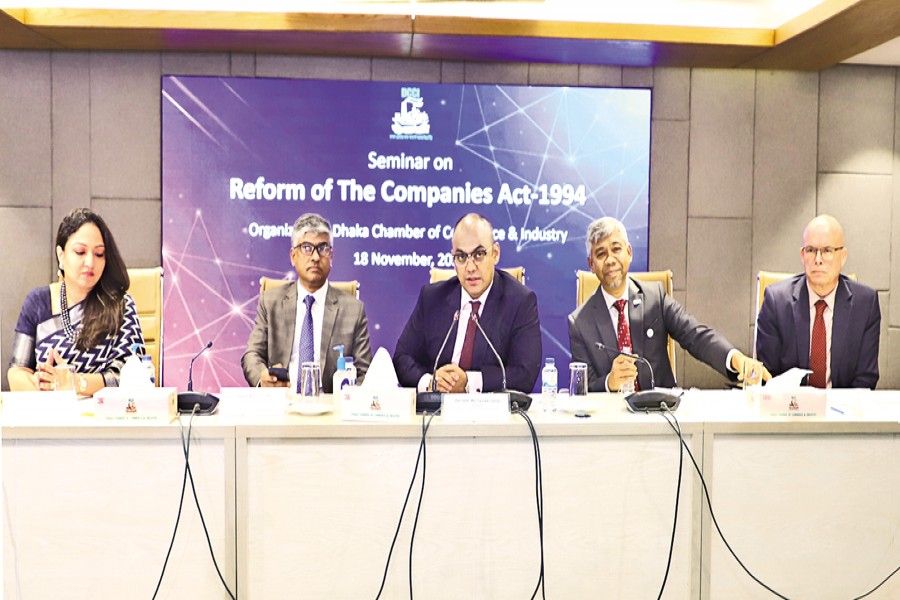Amendment to Companies Act in final stage
Says commerce ministry senior secretary

Published :
Updated :

A high official of the Ministry of Commerce (MoC) said on Saturday the amendment to the Companies Act was in the final stage and it was waiting for necessary vetting and scrutiny.
"We'll soon send it to the Cabinet Division for its approval," said MoC Senior Secretary Tapan Kanti Ghosh.
Regarding automation of the RJSC (Registrar of Joint Stock Companies and Firms), he said it would be in place by December.
"We don't want to make business complicated, rather less interference brings more efficiency at the end, and we believe in this philosophy," Mr. Ghosh said.
He was speaking as the chief guest at a seminar on 'Reform of Companies Act 1994' organised by the Dhaka Chamber of Commerce and Industry (DCCI) at its auditorium in the city.
He appealed to the businesses not to do profit only, rather, think about the community, society and well-being of the people while doing business.
He agreed that not all the companies were of the same size, so the government had to give support to the SMEs (small and medium enterprises), deemed the lifeline of Bangladesh's economy.
He also termed the Intellectual Property Rights (IPR) as very crucial for a fair competition among businesses.
The DCCI suggested boosting the business confidence and attracting more foreign direct investment (FDI) in the country.
DCCI President Barrister Md. Sameer Sattar said that the Companies Act was unable to cater to the needs of businesses across the board.
The DCCI chief said that in order to create a pro-business environment with corporate governance in Bangladesh, formulation of relevant policies including Companies Act was instrumental.
He also said that the Companies Act was unable to meet the needs of the diverse businesses.
He recommended full-fledged automation and maximum flexibility to use technology within the framework, provision of Alternate Dispute Resolution (ADR) for speedy dispute resolution.
He also pleaded for a separate section on Merger and Acquisition as per global practices.
Lastly, he stressed the need for increasing capacity of the Registrar of Joint Stock Companies and Firms (RJSC) to better monitor and enforce the company law compliance and governance.
Barrister Rashna Imam, Advocate, the Supreme Court of Bangladesh, presented a keynote paper at the seminar.
She highlighted few reform proposals like the necessity of a better legal framework for merger and acquisition to fill the legislative vacuum.
The winding-up procedures for a company remained a lengthy and expensive process, she said.
She recommended making it much easier. She also pleaded for a provision on alternative dispute resolution (ADR) or mediation to be inserted into the new Companies Act.
She further informed that "Independent Director" should be mandatory for publicly unlisted companies for better transparency.
Provisions on appointment, qualifications, roles and responsibilities of Company Secretary for all companies should be made clearer, she added.
Md. Shahadat Hossain, FCA, Council Member and former president, ICAB, said that timely holding of annual general meeting (AGM) was very important for compliance.
He said that winding up of a company should be easier and the process should be short.
In maximum private companies, independent directors could be introduced for the sake of transparency, he said.
There was no unique definition of SME in the country, but it was very essential, he added.
Md. Abdur Rahman Khan, FCMA, President of ICMAB, said that reform of the Companies Act would ease the business processes.
He said that the Companies Act was a dynamic law in nature, but with the time changing, the law needed to be updated.
The Companies Act should be amended in every two to three years to make it more relevant.
Md. Abdus Samad Al Azad, Registrar (joint secretary), RJSC, said that automation of RJSC would bring more efficiency.
He also said that at least seven to eight more functions of RJSC should be streamlined to give better services. The matter of confidentiality in connection with business account and password should be addressed in the Act, he mentioned.
Martin Holtmann, Country Manager, IFC Bangladesh, said that the Act was not fit for modern financing instruments.
"First of all, we need to reduce the risks,' he added. "We need to formalize the informal sector outside the data."
Chairman and Managing Director of Unilever Bangladesh Zaved Akhter emphasized integration and compliance with the Companies Act. He also underscored the need for implementing ADR for any business dispute settlement.
In the open discussion session, other speakers also urged an effective and timely Companies Act to ease the business process aligned with modern rules and regulations.
DCCI Senior Vice President SM Golam Faruk Alamgir (Arman) and Vice President Md. Junaed Ibna Ali were also present at the seminar.
talhabinhabib@yahoo.com


 For all latest news, follow The Financial Express Google News channel.
For all latest news, follow The Financial Express Google News channel.